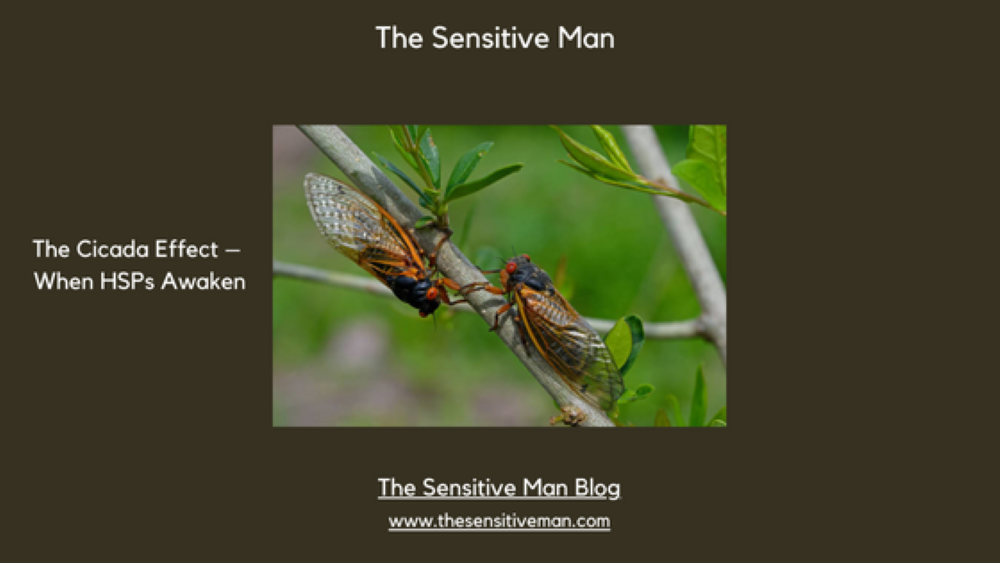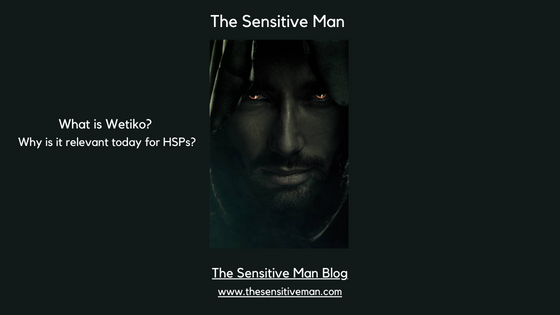|
A Blog about Sensory Processing Sensitivity from the Worldview of a High-Sensing Male
If you've ever lived anywhere in a temperate to tropical climate, you've likely heard the loud mating calls of the insect Cicadidae, more popularly known as Cicadas. These winged insects emerge annually or, in the case of the Magicicada, every thirteen to seventeen years to mate, make a big splash with loud mating calls, and then die. The eggs they produce give way to burying nymphs which become the next generation, waiting patiently underground until the next cycle begins. I mention this locust-like insect not so much because those qualities remind me of HSPs, but rather their predictable emergence from what would seem like a long slumber to return to fulfill an evolutionary purpose. However, the reality is that they never left but were submerged to seem oblivious to the outside world, only to return at the right interval—the right time. Perhaps, this is a stretch, but the Cicada effect, as I'm describing, is when an animate species seemingly asleep reemerges for a short, pointed mission, then blends back into the earth, waiting on the next right time. So, strangely, HSPs could be emerging now, during a time in human history, to perform a needed function. Less obnoxious and less noisy than Cicadas but more important to the evolution of our species. And, although we don't literally fall asleep, we can often seem dormant until we have our cautionary role kicks in. What role do HSPs play? A question that many HSPs ask is, what role do we play for humanity? Dr. Elaine Aron alludes to the idea that nature has created a small part of the human population – us, to provide thoughtful, cautious inputs into decision-making where we perform roles as wise counselors or as a priestly function. Our deep-thinking natures, natural nurturing, and empathetic tendencies make us ideal advisors to the warriors and kings and counselors to the general population. The world is turning at an ever-faster pace, and decisions seem less thoughtful and less insightful by our leaders and decision-makers. There seems to be less effort to think long-term, consider consequences, and not seek parity or equity in decisions. HSPs could make a difference here. But to be recognized, we need to recognize these qualities in ourselves. We need to own our traits and employ them in our interactions with others, especially those in leadership positions. The world could use our insights, especially right now. When HSPs awaken? I see this happening every day. More and more people are emerging to the reality that they are HSPs. There's that Eureka! Moment and then the long pause for, now what? What do I do with this trait? By the latest estimates, there are over two billion HSPs in the world. Although we don't represent a large proportion of the human population, it is not an insignificant number. And even within the HSP population, I don't believe the entire community needs to mobilize. Critical mass could be as simple as a small percentage of HSPs awakening to this purpose. However, as more HSPs become aware of the trait, the greater the possibility for influencing change. And as more and more HSPs "come online," we need to be spreading the message that they also have an evolutionary purpose in addition to their individual life missions. Depending upon the individual, this purpose may be relatively small or large, but the days of apologizing for being highly sensitive are long past. The days of masking the trait are over. We are sensitive for a reason, and now is the time to acknowledge that. This awakening could take a lot of different forms, perhaps, in many ways, unimagined. Maybe, as younger HSPs, those in the millennial or GenZ generations, come to terms with their trait, things will begin to evolve as to correct and proper action. Unlike myself, younger HSPs have a lifetime ahead to assimilate the trait into their lives, which makes a big difference. These younger generations will be "turned on" to this insight earlier in life and can utilize it to organize and affect generational changes. They can and will impact decisions. I see that happening now, not only with HSPs but with those who don't share the trait. The upcoming generations are already aware of needed changes and are savvy enough to demand them. HSPs can and should be in this mix. I do feel the awakening happening. It is a conscious awareness of wrongs done, necessary changes, and plans to be enacted. Yeah, it might also be a spiritual awakening, as many claim, but it is a clarion call to change. Surely underneath, with feet to the ground, the sound of change is coming. And HSPs will be a big part of that. Arising like Cicadas, coming to make some noise in our HSP way.
1 Comment
A Blog about Sensory Processing Sensitivity from the Worldview of a High-Sensing Male
I have often spoken of the evils of hegemonic masculinity. Unfortunately, this corrupted form of masculinity is a real thing. Still, it only describes the results of its leading characteristics: unbridled greed, the willingness to exploit and subjugate the helpless or repressed populations, and the almost obsessive accumulation of wealth and power. Hegemonic masculinity describes the outward manifestation of a disease, the traits, and those most likely to promote its spread, but it doesn't explain the causes or the condition. Indigenous people have a word for this disease – Wetiko or Wendigo. It comes from an Algonquin word meaning a malevolent spirit or creature with an insatiable appetite for greed and self-aggrandizement. It is often associated with cannibalism in indigenous lore—a very fitting descriptor for hegemonic masculinity. It seems a perfect description of the incessant pursuit of wealth and exploitation of resources and people we have witnessed for thousands of years across the planet. Most notably the conquest of the Americas by Europeans. This conquest set the cornerstone for this disease in the New World and cemented into global consciousness that greed was good. Capitalism runs amok. What is Wetiko? Wetiko is more than just a mythological creature or spirit; it now is a fitting description of a psycho-social disease that pervades our planet. It has been likened by Paul Levy, author of Wetiko: Healing the Mind-Virus that Plagues Our World, as a virus of the mind and soul, an appropriate contemporary metaphor for the disease. Levy sees this affliction as a dark aspect of human nature marked by domination, subjugation, and exploitation, much like we see in the description of hegemonic masculinity. But, unlike hegemonic masculinity, Wetiko affects more than just wealthy white men. Instead, it is pervasive across cultures around the planet, a rush to grab all that can be taken and exploited for wealth accumulation by a few. Capitalism as we know it has devolved into a Wetiko-like virus that engulfs the minds of many. Regardless of social standing or wealth, the lure or prospect of wealth obsessively drives common people into self-defeating support of leaders who promote the message of profit over people or the planet. The attachment to power lures them to support this self-destructive behavior, and although they have little hope of gaining wealth and power, they dutifully abdicate their only source of power – their vote. They become, in essence, a willing host to perpetuate the virus. This disease has been with us since the dawn of the agricultural age. When production outpaced need and wealth accumulation began in earnest, many became willing hosts to the virus. The addiction to wealth and power spread, well, like a virus. The Concept of Thought Forms and Memes and Antecedents in Biology The idea of a mind virus isn't farfetched in today's world, where real world viruses ravish human populations and alter behavior patterns. After all, we have computer viruses that mimic the work of biological viruses; why not mind viruses? The concept has its roots in ancient religion from Buddhism, Taoism, and Sufism; the ideas of thought forms that stand on their own in physical reality and the idea of shared collective consciousness, along with the interconnectedness of all things, makes a fertile ground for this notion to root. In a more contemporary framework, the Swiss psychiatrist Carl Jung describes the collective unconscious as a repository of shared memories and archetypes. It is not much of a stretch to envision mind viruses, like memes, embedded into our consciousness via modern communication supporting themselves off the host and perpetuating across the species as a collective truth, regardless of any objective reality. Like Wetiko, it spreads from host to host, possessing the infected soul with a drive or obsession for greed and a cannibalistic view of all material around the host as something to be consumed. It's gluttony and greed that aids in perpetuating the virus, much at the expense of the unwitting host. The most obvious analogy is to cancer, programmed to proliferate, gobbling up all living matter and eventually killing the host. Ironically, as it takes the host, it produces a coldness within the victim's heart, where heartlessness encourages the desire for more. The Prime Directive for all DNA-based life forms is always to replicate and reproduce. The disease, modern Capitalism, is only satiated when it creates more capital at whatever cost to the environment, people, or the future. In its severe corruption, which is to maximize wealth and self-interest, there is an inherent belief that there is some invisible hand called the marketplace that will keep things in balance, as each participant is blindly pursuing their self-interest. This is the great deception, the veil that hides the virtual protein spike of the virus. Can we defeat the Wetiko? Because of the insidious nature of the mind virus and how cleverly it blinds the victim to its presence, the only antidote is conscious self-awareness. Carl Jung warned of a massive self-delusion turning our powerful creative capacity into self-destruction of the species. At a worldwide scale, the infection is massive. Despite continuous warnings from nature and the "prophets," the world seems to be marching headlong into an extinction event. What other explanation would explain the lemming-like way we are destroying our planet and ourselves through pollution, war, and massive economic inequality? It is a form of collective madness that, if we don't snap out of it soon, we have a dark future ahead, if we have one at all. We need, as HSPs and as humans, to promote the conscious self-awareness mentioned above. I'm not saying that HSPs are different or have special protection against Wetiko. Still, I do believe we share an empathetic awareness of what is happening in the world today. We could be the leaders or at least the messengers or catalysts to create awareness before it's too late. Write, protest, organize, get active and educate yourself and others. Unfortunately, there is only so much time. |
AuthorBill Allen currently lives in Bend, Oregon. He is a certified hypnotist and brain training coach at BrainPilots.com. He believes that male sensitivity is not so rare, but it can be confounding for most males living in a culture of masculine insensitivity which teaches boys and men to disconnect from their feelings and emotions. His intent is to use this blog to chronicle his personal journey and share with others. Archives
July 2024
Categories
All
|



 RSS Feed
RSS Feed
